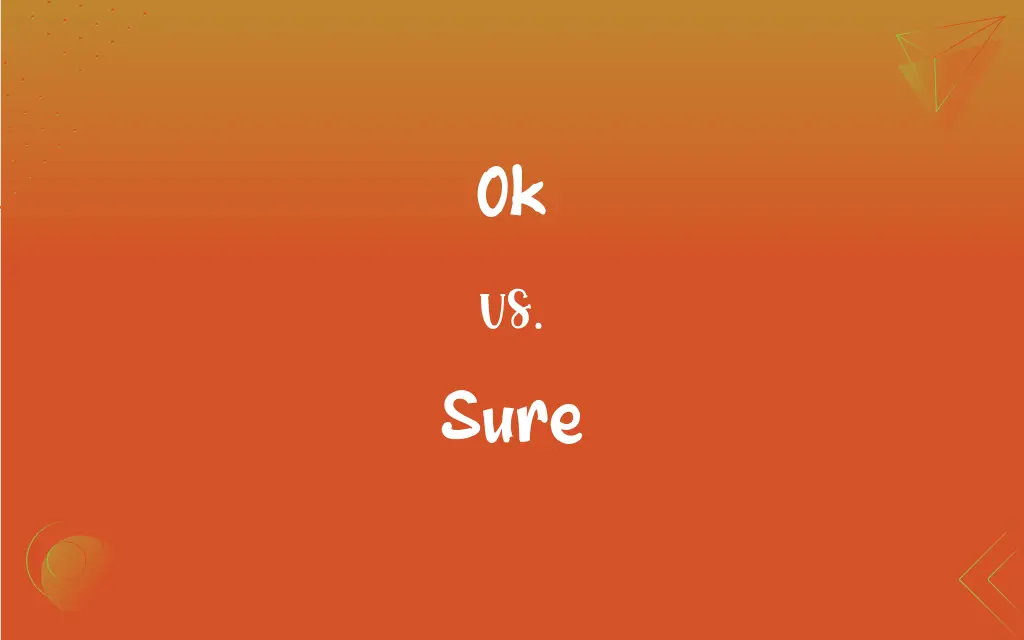Ok vs. Sure: What's the Difference?
Edited by Janet White || By Harlon Moss || Published on January 15, 2024
"Ok" is a general term indicating acceptance or agreement, while "sure" conveys a more enthusiastic or certain agreement.

Key Differences
"Ok" is often used to express neutral agreement or acknowledgment, while "sure" typically implies a more positive or willing response.
In terms of tone, "ok" can sometimes seem indifferent or passive, whereas "sure" often carries a tone of eagerness or assurance.
"Ok" is versatile, used in various contexts to indicate that something is satisfactory, while "sure" is more specific to agreement or certainty.
When used in questions, "ok" can seek confirmation, while "sure" is more often used to assert confidence.
In casual conversation, "ok" can be a simple acknowledgment, while "sure" can reflect a more positive engagement or interest.
ADVERTISEMENT
Comparison Chart
Connotation
Neutral, satisfactory
Positive, enthusiastic
Tone
Can be passive or indifferent
Generally eager or assured
Usage in Response
Acknowledgment, acceptance
Willing agreement, certainty
Emotional Implication
Often lacks strong emotion
Implies readiness or confidence
Frequency of Use
Highly common and versatile
Common but more specific to agreement
ADVERTISEMENT
Ok and Sure Definitions
Ok
Used to acknowledge a statement or instruction.
Ok, I understand the assignment.
Sure
Indicating enthusiastic agreement.
Can you help me? Sure, I'd be happy to.
Ok
A term indicating agreement or consent.
Is it ok if I leave early today?
Sure
Signifying no doubt or hesitation.
Are you sure about your decision?
Ok
Expressing that something is satisfactory.
The food was just ok, not great.
Sure
Used to express certainty or confidence.
Are you coming tonight? Sure, I wouldn't miss it.
Ok
Indicating mild approval.
Your idea is ok, but it could be improved.
Sure
Used to affirm a positive response.
Do you like the idea? Sure, it sounds great.
Ok
Used to check or confirm arrangements.
We'll meet at 6, ok?
Sure
Expressing willingness or readiness.
Sure, I can take care of that for you.
Ok
Satisfactory or agreeable; acceptable
Was everything OK with your stay?.
Sure
Confident, as of something awaited or expected
I am sure we will win the game.
Sure
Impossible to doubt or dispute; certain
We have sure proof of his innocence.
FAQs
How is OK spelled?
OK can be spelled as ‘OK’, ‘O.K.’, or ‘okay’, all of which are acceptable.
What does OK mean?
OK generally means 'acceptable' or 'satisfactory', and is used to express agreement or acknowledgment.
Is OK universal?
OK is widely recognized and understood in many languages, making it a near-universal term.
Is OK an acronym?
The origins of OK are debated, but one popular theory suggests it began as an acronym for “oll korrect,” a playful misspelling of “all correct.”
Is OK informal?
Yes, OK is considered informal and is more suited to casual conversation or correspondence.
What does sure mean?
Sure commonly means certainly or definitely, expressing agreement or confirmation.
Can OK be used as a verb?
Yes, in informal contexts, OK can be used as a verb meaning to approve or authorize something.
Can OK express mild disappointment?
Yes, depending on tone and context, OK can express mild disappointment or reluctant agreement.
How is sure used to express confidence?
When someone is confident about something, they might say "I'm sure" to express certainty.
Is sure formal or informal?
Sure is considered informal and is best used in casual settings.
Can sure indicate reluctance?
Depending on tone, sure can sometimes imply reluctance or lack of enthusiasm.
Can sure mean ‘certainly’?
Yes, sure can be used interchangeably with ‘certainly’ to affirmatively answer a question.
What is the difference between sure and surely?
“Sure” is an adjective or adverb indicating agreement or confidence, while “surely” is an adverb emphasizing certainty or expectation.
What is the difference between OK and okay?
There is no semantic difference; it's a matter of stylistic preference.
How is OK used in questions?
In questions, OK often seeks confirmation, as in "Is that OK with you?"
Can sure be used to answer negatively?
Rarely, but in some contexts, especially with particular intonation, it can imply a negative response, though this usage is less common.
Can OK indicate mediocrity?
Yes, when used to describe quality, OK often implies something is neither good nor bad, but mediocre.
Is sure a polite response?
Yes, sure is often used as a polite, affirmative response to a request or question.
How does intonation affect the meaning of sure?
Intonation can change the meaning of sure from enthusiastic agreement to skeptical or grudging acceptance.
Is sure used differently in different cultures?
In some cultures, sure may be perceived as less definitive than a direct “yes.”
About Author
Written by
Harlon MossHarlon is a seasoned quality moderator and accomplished content writer for Difference Wiki. An alumnus of the prestigious University of California, he earned his degree in Computer Science. Leveraging his academic background, Harlon brings a meticulous and informed perspective to his work, ensuring content accuracy and excellence.
Edited by
Janet WhiteJanet White has been an esteemed writer and blogger for Difference Wiki. Holding a Master's degree in Science and Medical Journalism from the prestigious Boston University, she has consistently demonstrated her expertise and passion for her field. When she's not immersed in her work, Janet relishes her time exercising, delving into a good book, and cherishing moments with friends and family.































































